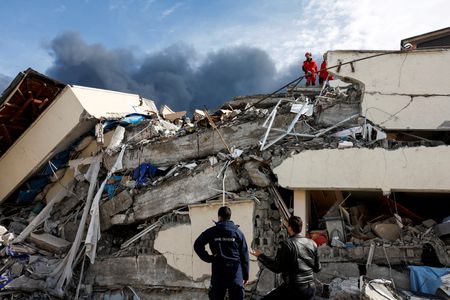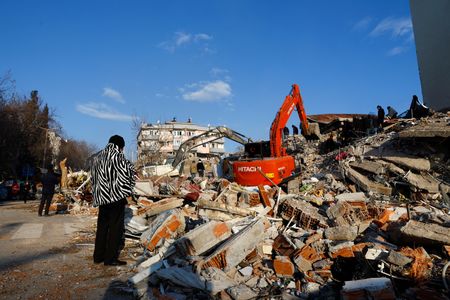By Orhan Coskun and Nevzat Devranoglu
ANKARA (Reuters) – Massive earthquakes in Turkey will add billions of dollars of spending to Ankara’s budget and cut economic growth by up two percentage points this year, officials and economists said, as the government faces huge rebuilding ahead of tight elections.
Nearly 10,000 people were confirmed to have been killed in northern Syria and southern Turkey by earthquakes that struck on Monday, leaving a trail of destruction across the region.
Thousands of buildings, including homes and hospitals, roads, pipelines and other infrastructure have sustained heavy damage in the area, where some 13.4 million people live.
While officials say the extent of the destruction is not yet clear, they believe rebuilding will stretch Turkey’s budget.
“There will be billions of dollars of damage,” one senior official told Reuters, adding there would need to be a rapid reconstruction of infrastructure, houses and factories.
The weeks ahead of retrieving bodies and clearing rubble are likely to dominate the run-up to presidential and parliamentary elections due on May 14, which already posed the toughest challenge to President Tayyip Erdogan’s two decades in power.
Turkey has been beset for years by soaring inflation and currency crashes as Erdogan pushed unorthodox economic policies. His calls for low interest rates set inflation soaring to a 24-year high of 85% last year, and the lira slumping to one tenth of its value against the dollar over the last decade.
Turkey has much lower debt levels than most countries but years of FX reserve depletion, erosion of the central bank and judicial system’s independence and unorthodoxy more generally have left their mark.
The earthquakes struck as government policies prioritise production, exports and investments to boost growth, despite inflation standing at more than 57% as of January.
Earthquake damage is also expected to hit production in the affected region, which accounts for 9.3% of Turkey’s gross domestic product (GDP). Indicating the extent of the disruption, electricity use in Turkey dropped 11% on Monday, compared to a week earlier, Energy Exchange Istanbul (EPIAS) data showed.
That disruption could hit economic growth this year.
Three economists calculated GDP growth could drop 0.6 to 2 percentage points under a scenario where production in the region drops 50%, which they said would take six to 12 months to recover.
Separately, a senior official said growth could be 1 or 2 percentage points below the targeted 5%.
“Some of the investment resources foreseen in the budget will need to be used for these areas,” the official said.
The southeast region hit by the earthquake accounts for 8.5% of Turkey’s exports and 6.7% of imports. But economists say the earthquakes are unlikely to affect Turkey’s trade balance as both exports and imports are expected to drop.
Wolfango Piccoli, managing director of consultancy Teneo Intelligence, said the earthquake is unlikely to inflict serious damage to the economy compared to one of similar magnitude in 1999 that struck Turkey’s northwest industrial heartland.
“The earthquakes hit one of the country’s poorest and least developed regions. They did not affect areas farther west favored by foreign tourists, who have become one of Turkey’s most important sources of foreign exchange,” he wrote in a note.
(Additional reporting by Jonathan Spicer; Writing by Ali Kucukgocmen; Editing by Alexandra Hudson)


